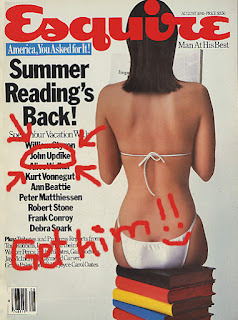What's an ambitious rock duet gotta do to distinguish itself from all the other riff-raff duets out there?
Sleigh Bells surely know, but they ain't telling.

The prestige treatment they received in the glossies prior to the release of their sophomore album was something I hadn't seen since the Followill Boys groused their way to drunken stardom. Every glossy on the stand seemed to offer a blizzard of Photoshopped snaps of
Derek E. Miller and
Alexis Krauss in
full-pout mode. A solid month of facing these two cutie-pies as they copped a surly 'tude made me want to bring them home and liquor them up with peach schnapps, just so I could watch them pee on the roses and puke on the cat.
I settled instead for buying the
CD —
Reign of Terror — at Walmart, and I've gotta say: I should have stocked up on the schnapps.
Reign Of Terror is fine enough. It has its moments of sonic interest, even catchiness, and certainly suggests what must be a terrific stage show. But it's not going to get much repeat play in this household.
Another recent, impulsive CD purchase that won't be getting much repeat play:
The Song Remains The Same. In Zep's case, though, I'm very fond of the music and the performances; it's just unlikely that I'll often be in the mood to indulge Jimmy Page's 28-minute attempts at tripping the light fantastic for his New York audience. Nor was he alone. All four of those dudes were ready and willing to unleash solos that ran as long as the average Sleigh Bells concert. I'll say this about that: whenever Zep took over a stage or studio or abandoned castle they made a point of hammering out music that they, at least, would never get bored playing.
A lofty ideal which, if Robert Plant's
current attitude is any indication, ultimately failed them. It's also an ideal which the super-fragmented digital culture has lost all track of. Audiences and performers have changed, as they must, but I can't help nursing the codgery thought that today's music is just a wee bit (gasp!)
disposable. But so it goes. Lofty expectations rarely serve anyone well in the mercurial world of rock 'n' roll.

I had lofty thoughts of my own, back when I was Sleigh Bells-aged. That was the early 80s, when I spent most weekday evenings penning Very Important Prose in Scribner notebooks. Like any young “artiste” I approached my chosen form the way Houdini approached a pair of handcuffs. Every short story was a brilliant reinvention of the wheel; every longer piece was . . . well, who knows what the hell they were? In the end they became a huge pile of paper in a box.

As I wrote I didn't mentally bother with any of my peers. If the cover of Esquire was any indication, they had yet to distinguish themselves. And while the generation of writers just ahead of me weren't without interest, I didn't pay much attention to them, either. My get-published strategy, such as it was, was to head directly for the king of the hill and push him off with the apparent immediacy of my own brilliant spin on their game. I figured there were three guys who routinely seized the title of America's Most Important Writer: Philip Roth, Norman Mailer and John Updike. Or, as my “peer” David Foster Wallace succinctly described them: the
Great Male Narcissists.
My strategy (thankfully) didn't pan out. My peers, however, developed a unified strategy of their own that did indeed distinguish themselves from the GMNs, a protagonist they've shared in common:
The Great American Loser. Elaine Blair surveys the field and admits it's a tactic that works, for her and a whole lot of other readers. But at what cost?
It's been curious to me the collective sigh of relief we've breathed at the passing of the GMNs. Roth still stirs
a few people because he's still alive and writing, but is either Mailer or Updike on anyone's required reading list? It's been years since I bothered with either of them, so I recently thought I'd try an Updike, to see if the contents retained any sort of potency. I reached for
Couples, figuring the voluminous sexual activity would, if nothing else, retain my interest.
After 75 pages I resorted to speed reading. A few more tries at that, and I finally put the book down, unfinished. The sex is boring, chiefly because the women are pliant ciphers. A few hundred pages of that can leave the reader with an impression of a fantasist whose masturbatory goals are best accomplished to the sound of his own voice.
This was a tune the GMNs never got bored of singing. It may be true that in the passing of their voices, our culture has swung decidedly to the fragmentary and disposable. But who could blame us?










